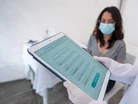Trusted data is the key to improved patient experiences

Better patient experiences are closely associated with lower medical malpractice risk, as well as greater employee satisfaction, leading to lower turnover. Patients with better care experiences often have better health outcomes—an important factor as the industry moves towards value-based care models, reimbursing providers for the quality—not quantity—of services.
It is incredibly important to have a trusted data foundation to deliver superior customer experiences and healthcare is no exception. As healthcare providers invest in digital channels and analytics, the need for improving data quality and trust in the core business data takes a higher priority.
Irem Radzik, Senior Director of Product Marketing at Reltio
High-quality, trusted data provides the foundation for seamless patient experiences
There are a few key elements that define the patient experience and the critical role high-quality, trusted data plays.
Care interactions: As patients play an increasing role in their own care, you need to deliver personalised, consistent experiences across all patient touch-points. So your patients can easily search for a physician online, schedule their appointments and communicate with care teams—and view their test results and other information on your portal, and via smartphone alerts and reminders. If you have fragmented, poor-quality patient and provider data, you probably can’t deliver consistent patient interactions at those touch-points.
Care continuity: Your care teams need a comprehensive view of health history and speed up diagnosis to optimise care. But due to separate EHR and other systems used by various organisations across the care continuum—each with their own data quality challenges—it can be difficult for your teams to get a complete view and trust the data in front of them. Reliable patient data linking is crucial to building accurate longitudinal patient records with clinical histories to support decision-making and better health outcomes.
Care compliance: One way to improve patient outcomes is to help your patients follow doctors’ orders after appointments or hospital discharges. You also want to encourage them to make healthy choices and advise them when to seek help. However, poor quality patient data, such as inaccurate contact data and communication preferences, makes it harder for you to communicate with the patients and their care providers at their homes. This impedes your efforts to deliver care and guidance to them in a timely and compassionate manner.
Specialty referrals: Inaccurate provider directories block patients’ efforts to find the right physician—in-network, near home, and with the right specialty. It not only creates a poor patient experience, but it also leads to patients choosing a physician in a different provider network. One study compared Medicare’s database with physician directories, and only 19% of directories had consistent address and specialty information. An accurate provider directory should also be able to integrate third-party data ensuring referrals are timely and accurate, which increases patient satisfaction and loyalty. Research shows that with accurate provider data, this referral leakage can be reduced significantly and could even boost your revenue by as much as 10-30%.
All these areas are positively impacted by having clean, unified and trusted data available when you and your patients need it.
How modern master data management (MDM) improves patient experiences
Modern MDM unifies and cleanses your core data, reliably links patient profiles from across systems, enriches it with third-party data, and delivers it in real time where it is needed. This trusted data fuels your operational and analytics systems, and gives you an accurate view into relationships with the patient across all data sources. You gain visibility into patient interactions across all channels including, doctor’s appointments, hospital visits, insurance claims if applicable, post-op follow-ups and more.
Having consistent, trusted data enables you to enhance patient experiences across all touch-points, streamlining their interactions with your organisation as well as improve patient health outcomes by improving continuity of care, care compliance, and patient analytics. It can also decrease patient spending by reducing claims denials and helping them avoid surprise bills and make it easier for patients to find the right referrals, which also reduces your revenue leakage.
Our recently launched healthcare velocity pack provides an out-of-the-box healthcare data model with patients (and their households), practitioners, HCOs, health plans, and payers, which can be used as is or extend as needed. It also offers predefined configurations—driven by best practices—for cleansing, matching, survivorship, and UI Provisioned NPI integration for data enrichment and prescriptive implementation methodology. In addition, we integrate with Google Cloud Healthcare Data Engine to make it easier for you to build longitudinal patient records with trusted data for advanced analytics and operational decisions.
The impact of modern data management is not limited to patient experience. Operational efficiency—gained in both data operations and business processes—reduces cost, lowers risk, and improves compliance. Ultimately, by choosing MDM, it can help you implement a simplified, agile, and cost-effective process, so you can start delivering better patient experiences and health outcomes sooner.
- Google Lens & GS1 Boost Healthcare TransparencyTechnology & AI
- How can AI Transform Recruiting in the Healthcare Sector?Technology & AI
- Alfa Laval Hopes New Center will Help Pharma InnovationSustainability
- Opella, Kimberly-Clark, Cencora: Top Stories in HealthcareProcurement & Supply Chain



